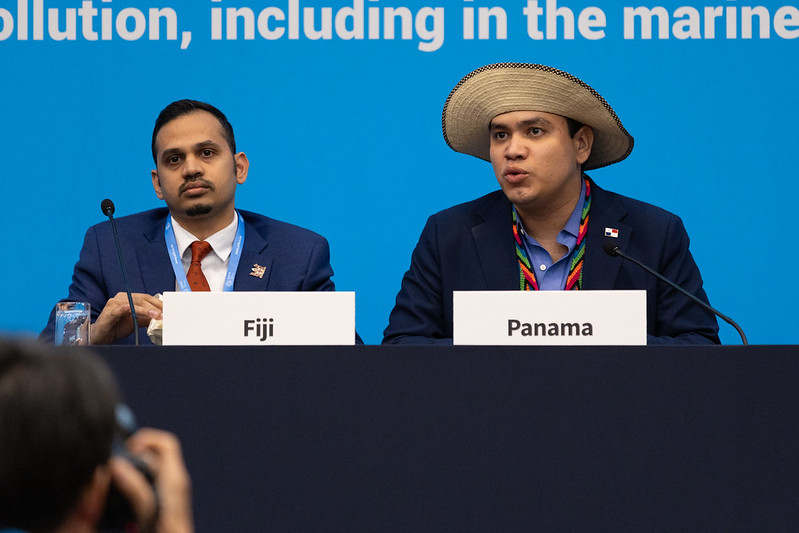
A cross-regional proposal has been put on the table by an alliance of 102 countries across the developing and developed world calling for the inclusion of a global target to reduce the production of primary plastic polymers to sustainable levels in the plastic treaty text.
With less than 36 hours to go for negotiations at the fifth and final Intergovernmental Negotiating Committee (INC-5), the coalition is urging countries to address the root cause of the plastics crisis—unsustainable production and consumption of virgin plastics.
This ambitious proposal emphasises all parties to “take measures across the full lifecycle of plastics” and report data on their plastic supply chains. It calls for a five-year review process, mirroring the global stocktake mechanism under the Paris Agreement on climate action.
Negotiations have stalled in Busan due to strong resistance from oil- and gas-producing nations, which argue that limiting plastic production falls outside the treaty’s scope. Although the original UNEA Resolution 5/14 , which guides these negotiations, explicitly mandated parties to address ‘the full lifecycle of plastics’, from production and consumption to disposal.
At a press conference at the Busan Exhibition and Convention Center (BEXCO), the Honourable Andrew Yatilman, Secretary of the Federated States of Micronesia’s Department of Environment and Climate Change, made a plea to the opposing nations. “The Gulf states want to protect their economy with fossil fuels, but what about us?” he asked. “Our economy is based on fishing, and that is being destroyed by plastic pollution. Give us a break.”
It is estimated that by 2050, there could be more plastic in the ocean than fish. Approximately 460 million tons of plastics are produced annually, and production is set to triple by 2060 under business-as-usual scenario.
With 99% of plastics derived from fossil fuels, the sector already contributes to over 400 million tons of greenhouse gas emissions annually. This figure does not include emissions from waste management (including transport), mismanagement, and degradation of plastic products.
Panama’s Special Representative for Climate Change, Juan Carlos Monterrey Gómez told reporters that the high-ambition group has already made concessions, dropping stricter targets to foster consensus and it was time for others to also “forget about red lines”.
“We are not here to negotiate a greenwashing recycling global treaty. We seek their leadership, we want their leadership. But if they’re not willing to lead, please – leave it to the rest of us, and get out of our way.”

Negotiations have intensified since the release of a draft treaty text on Friday by the INC Chair, Ambassador Luis Vayas Valdivieso of Ecuador. The draft text includes a proposed global target to reduce plastic production but also an alternative option of no text—meaning no action would be taken to reduce plastic production worldwide.
Fiji, the latest Pacific Island to join the High Ambition Coalition to End Plastic Pollution, remains cautiously optimistic despite the challenges. “I feel that we should be optimistic, even if my heart is giving up in those negotiating rooms,” said Dr. Sivendra Michael, Fiji’s Permanent Secretary for Environment.
“The alliances we have formed over the past few days fuel my hope because so many countries want to deliver for the planet and its people.”
The fifth Intergovernmental Negotiating Committee to develop an international legally binding instrument on plastic pollution, including in the marine environment is taking place in Busan, Republic of Korea, from 25 November to 1 December 2024.
The Pacific Islands are represented by the Cook Islands, Federated States of Micronesia, Fiji, Kiribati, Marshall Islands, Nauru, Niue, Palau, Papua New Guinea, Samoa, Solomon Islands, Tonga, Tuvalu and Vanuatu through the support of the Government of Australia and the United Nations.
They are supported by the Secretariat of the Pacific Regional Environment Programme (SPREP), working with partners the Pacific Islands Forum Secretariat (PIFS), Office of the Pacific Ocean Commissioner (OPOC), The Pacific Community (SPC), Forum Fisheries Agency (FFA), Environmental Investigation Agency (EIA), Centre for International Environmental Law (CIEL), University of Wollongong, WWF and Massey University.
For more information, visit: https://www.unep.org/inc-plastic-pollution/session-5